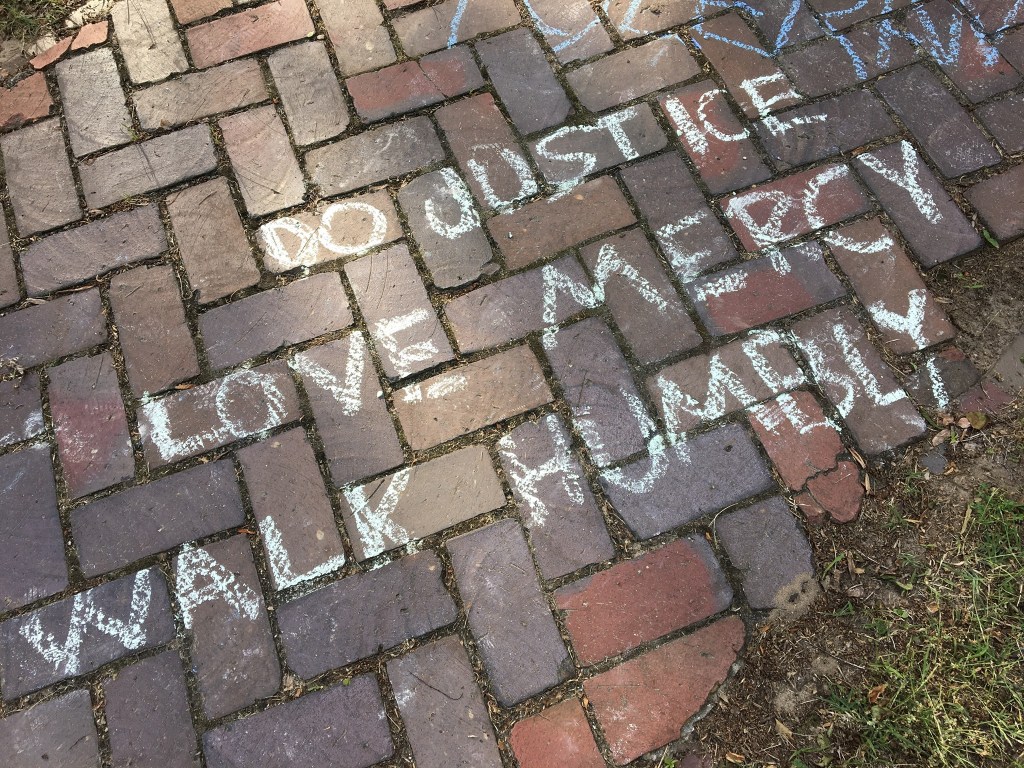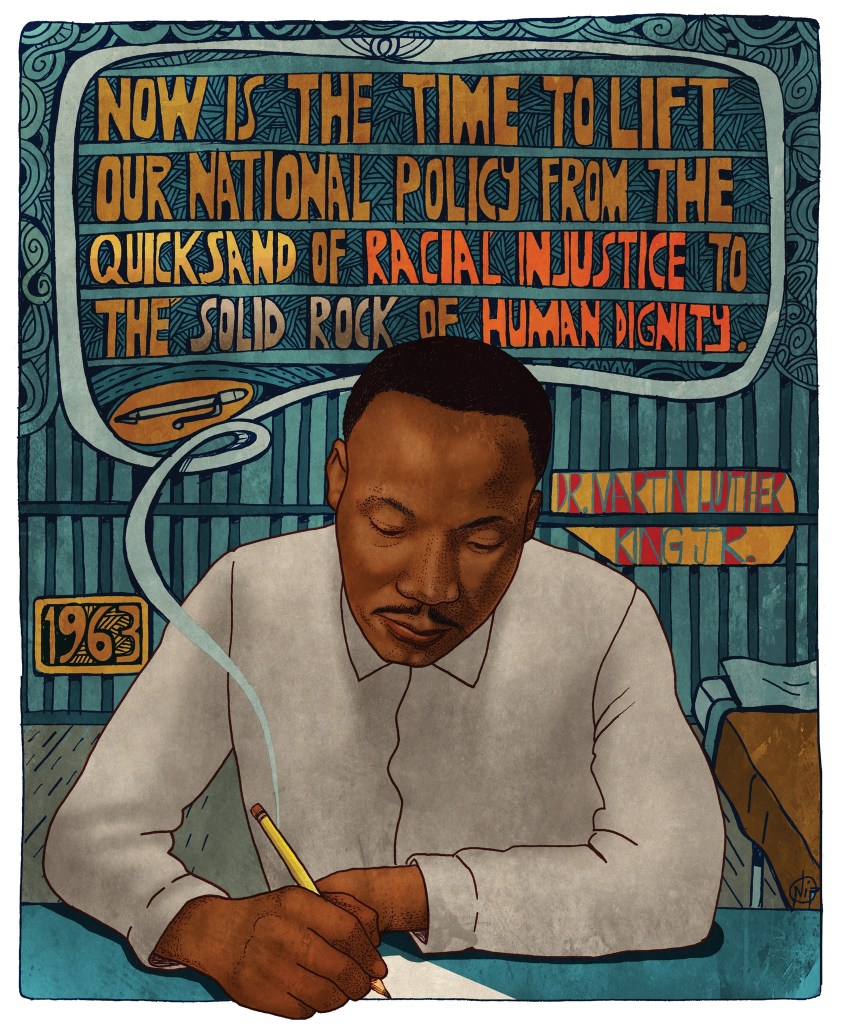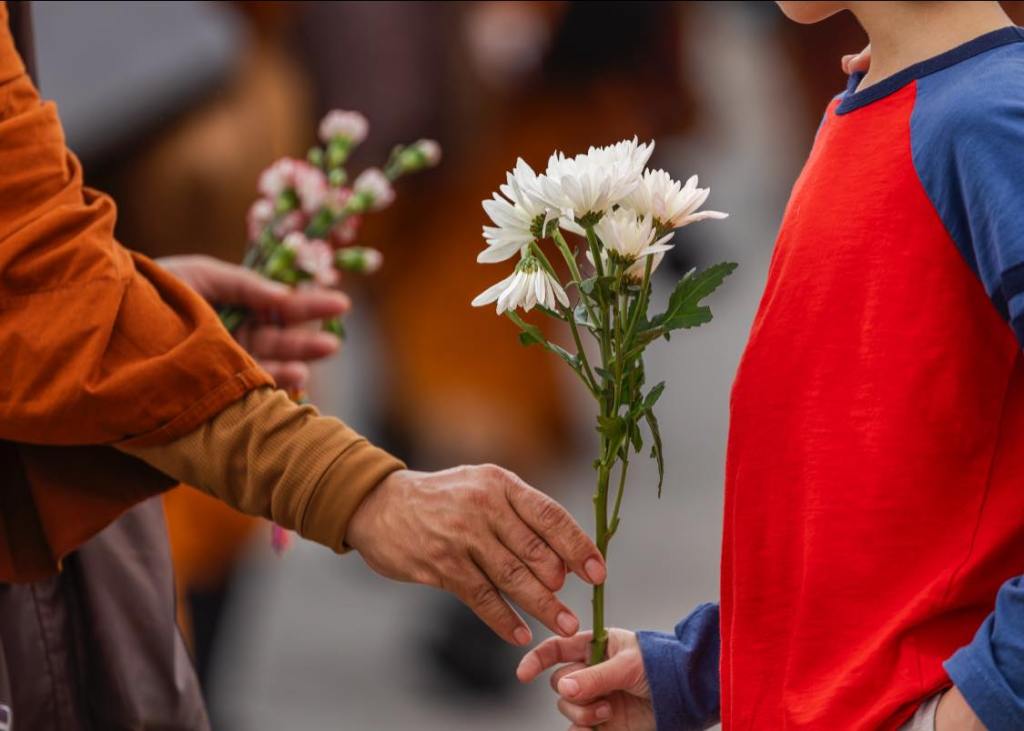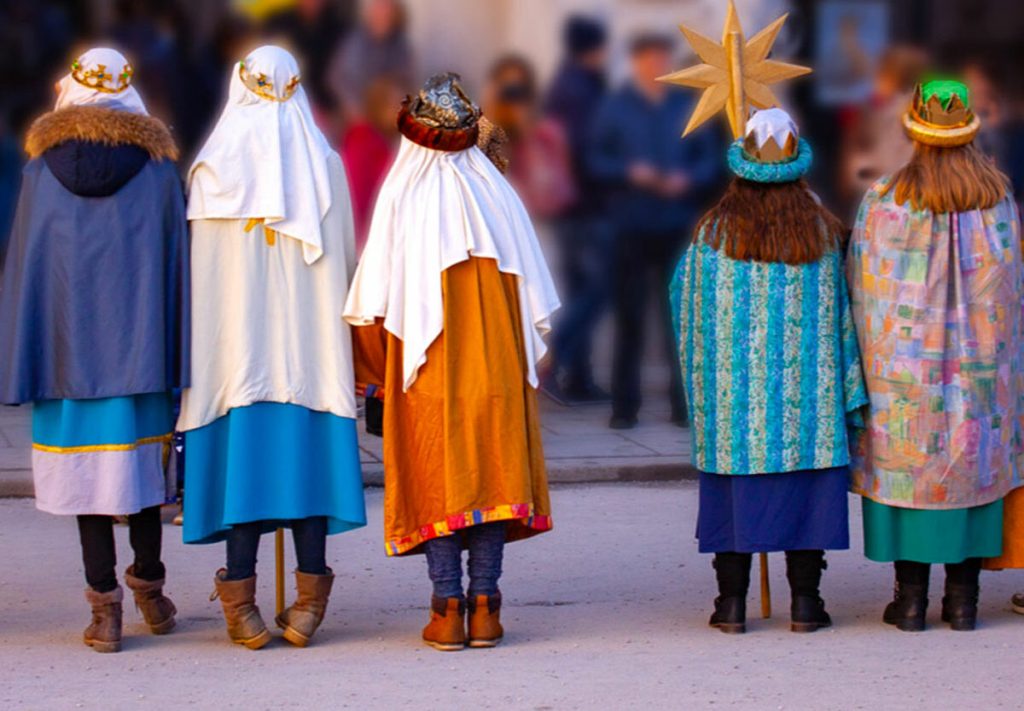At our 10:00 am service today, we honor the feast of Epiphany with our annual Epiphany Pageant. Every year I love watching the children and youth bring the Christmas story alive one more time. Part of what makes the service special is hearing the story with fresh ears – not from a clergy person reading from the aisle like every other Sunday, but with a variety of voices narrating and enlivening the words, making the incarnation story more incarnate. I love how the pageant keeps us in the Christmas moment one more week, and I love how the story brings all our Christmas characters under one roof, reminding us of the continual unfolding of the mystery of the incarnation. Though there is something certainly endearing about the whole experience of a pageant, there is also something quite profound in a pageant too.
But what pageants can sometimes do is focus our attention so intently on the manger – on Jesus and his family – that we forget what happens outside the manger is just as important as what happens at the manger. Even our beloved carol “We Three Kings,” draws us to the experience of the magi’s adoration in Bethlehem, without insight into what happens in Jerusalem. This year, after hearing of registrations, of humble births, of angel choruses, of everyday shepherds spreading the Gospel, and of cosmic explanations of the incarnation, we turn our attention to Jerusalem. Isaiah gives us some clue about where our attention is drawn. “Arise, shine; for your light has come, and the glory of the LORD has risen upon you…Lift up your eyes and look around…”[i] instruction in Isaiah is not for Bethlehem, but the city of Jerusalem[ii] – the city where Jesus’ journey will end, the city for whom Jesus weeps, the city of eventual redemption and salvation. There, Isaiah foretells of the incarnation, how the people of God are to reflect the light of Christ, and to pay attention to what is happening around them, to God incarnate.
Those words, “lift up your eyes and look around,” have been lingering with me. Instead of looking deep into the scene at the manger or with the holy family, I am drawn by what is happening in Jerusalem. Three things happen there. One, we learn more about the magi. The testimony of the magi is what most of us associate with Epiphany. Foreigners set out on a quest, more attuned to the cosmic nature of the incarnation than the people of faith. Their astrological findings do not simply fascinate them, but inspire action – a long, uncomfortable journey to see the incarnation for themselves. As profound as their witness is, they cannot complete the journey alone. They stop in Jerusalem for guidance. They know they are on the right path; they just cannot quite get to the proper place. And so, the magi stop and ask for help along the way. They know something significant has happened, but they need guidance from people of faith to fully realize their journey.[iii]
The magi’s insightful question, “Where is the child who has been born king of the Jews?” is a question that brings in the second action. The chief priests and scribes, the ultimate insiders of the faithful, those who hold the revelation of scripture and interpret scripture for the people of God, are given news that should be earth shattering. When asked about the birth of the Messiah, the religious leaders recall what they know of the Messiah: the Messiah is to be born of Bethlehem and is to shepherd and rule the people of God. The religious leaders offer the key – the prophecy of scripture about the coming Messiah. And yet, even though they have this scriptural foundation, they do not react to the news of the magi. Even though these wise people profess this awaited Messiah has been born, the religious leaders do not drop everything. They do not even ask to go with the Magi, just to check and see if this story might have something. They may be versed in scripture, but their inaction shows that even insiders sometimes need outsiders to be faithful.[iv]
Finally, the third thing that happens are the actions of Herod. Herod is probably the most fascinating to me. He is wise too, even if he uses his wisdom for his own nefarious purposes. Herod knows the announcement, even if from an outsider of a new king being born means his own kingship is threatened, and shows how fragile his rule is.[v] But instead of acting impulsively, he manipulates those around him. First, he calls in the religious leaders. You see, Herod is not a Jew – in fact, he is a Roman, serving at the leisure of the kingdom. But his subjects are Jewish, and so he is wise enough to seek their counsel on what a king, what a Messiah, might look like. But instead of sending his religious leaders to check things out in Bethlehem, knowing they might discover a true king among them, he secretly sends the foreigners, hoping to manipulate them into doing the work of finding the king, knowing he will get news from them so he can kill this new king. Herod is only worried about himself and his power, and he will do whatever is needed to maintain that power.
The foreign magi are so unfamiliar with the people of God, they do not initially understand the weight of their question about the new king. The scribes and religious leaders are so buried in their scripture, and so keen to keep balance with secular power, they do not realize the messianic fulfillment right in front of them. And Herod is so bent on keeping his power, he does not fully understand the power of God working all around him. All three of these agents in our story need the words of Isaiah today – all three need to lift up their eyes and look around.
We are not unlike the characters in our story today. How often are we so mired in our own power – as people of privilege and comfort, as Americans with power more globally, as members and advocates in this community – how often does a word about the movement of God, the promise of change, and the possibility of giving up some of our power to allow that fulfillment, make us just as nefarious as Herod – just as willing to manipulate the world around us? Or how often have we steeped ourselves in scripture, scouring God’s Holy Word, longing for some sort of guidance or truth, not realizing truth is being spoken through another right to our faces? Or how often have we been so intent on a mission, so focused on what we sense God calling us to do, we ignore the consequences of our actions, forget the power of our words?
Today’s scripture reading is certainly about the gift of the magi to us – the revelation of the incarnation, the insight of foreigners, and the abundance and homage the incarnation inspires. But today’s scripture reading is also an invitation to consider our own response to that incarnation in the modern era, considering the ways in which we have not lifted our eyes and looked around. Taking up Isaiah’s invitation to self-critique is important because there is also a promise in Isaiah. You see, when we lift our eyes and look around, we acknowledge the narrowness in our lives, or we acknowledge the ways in which we are blind to our own power, or we discover the ways in which we even hide behind our faith, we are then able to see the promise in Isaiah. Isaiah tells us to look around because glory of the LORD has risen upon us. Isaiah says in verse five, “Nations shall come to your light, and kings to the brightness of your dawn.” When we talk about shining our light on this holy hill here at Hickory Neck, this is what we mean. The gift of the magi to us is not news that is frightening. When we are not hoarding power or hiding behind our intellect or comfort zones, the news of the magi is news for rejoicing. And that rejoicing is light that draws nations, and kings, and neighbors, and strangers, and family members, and friends. The gift of the magi is the invitation to let go of the things that feel under our control, and embrace the thing in no way we control, but in every way brings us grace, love, and abundance. That is the kind of living that shines light from this hill and brings others to Christ’s light. That is the light offered to us today in the magi. That is the kind of good news worthy of pageants and proclamation today. Amen.
[i] Isaiah 60.1, 4a
[ii] Rolf Jacobson, “Sermon Brainwave #701 – Day of Epiphany,” December 29, 2019, as found at http://www.workingpreacher.org/brainwave.aspx?podcast_id=1216 on December 24, 2025.
[iii] R. Alan Culpepper, “Exegetical Perspective,” Feasting on the Word, Yr. A, Vol. 1 (Louisville: Westminster John Knox Press, 2010), 217.
[iv] Culpepper, 217.
[v] Stanley Hauerwas, Matthew (Grand Rapids: Brazos Press, 2006), 38-39.






